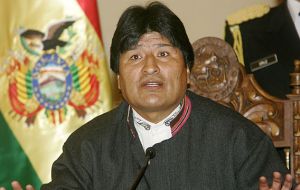MercoPress. South Atlantic News Agency
Morales and dissident governors reach Bolivian unity pact
 Evo Morales: “The people want us to stay together”
Evo Morales: “The people want us to stay together” Bolivian President Evo Morales and provincial governors have agreed to draw up a pact of national unity to prevent the country from splitting apart. Mr Morales and the governors said they want to settle their differences over a new draft constitution and revenues from natural gas exports.
Four of Bolivia's governors declared autonomy last month after Morales's allies adopted the draft constitution. Mr Morales's reform plans still need to be put to a referendum. The Bolivian president following on his campaign promises wants to give more political power to the poor indigenous majority and put through a land reform programme which was rejected by farmers and ranchers associations. Provincial governors in the rich lowland eastern provinces are concerned about how gas revenues are shared with the central government. They also want to see a revised version of the draft constitution. The governors of Santa Cruz, Beni, Pando and Tarija declared autonomy for their provinces in December after a constitutional assembly which did not include opposition delegates. These provinces hold the country's vital natural gas reserves and are home to important agribusinesses. "The people want us to stay together" Mr Morales said after 10 hours of negotiations that ran into Tuesday morning. "Let's work together to resolve our differences." Ruben Costas, the governor of Santa Cruz who has been spearheading the autonomy drive, said: "We all want peace and unity. What's important is that there's willingness to dialogue." Morales who is Bolivia's first indigenous president made rewriting the constitution a key part of his reform agenda privileging the indigenous majority which has for centuries lagged behind the European descendents. Among the proposals are allowing two consecutive five-year terms for presidents, greater state control of the economy and more autonomy for indigenous communities. There were frequent demonstrations, both for and against, during the debate over constitutional reforms, with protests sometimes turning violent leaving several people killed in street clashes. However the situation seemed to return to track when Mercosur openly and unconditionally supported the "legitimate government of President Morales" and Brazil signed several cooperation agreements to boost investments in the local oil and gas industry.




Top Comments
Disclaimer & comment rulesCommenting for this story is now closed.
If you have a Facebook account, become a fan and comment on our Facebook Page!